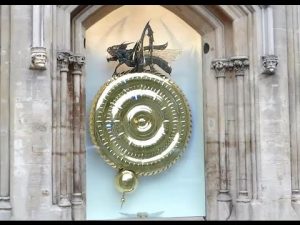Minister’s letter June 2019
Dear friends,
The month of June sees us enjoying the longest day of the year when it will stay light (weather permitting!) from sunrise at 4.46am until sunset at 9.21pm. Perhaps to us in our modern era with artificial lighting and some shops open 24 hours a day it makes little difference, but to our ancestors those long hours of daylight meant more time in which to accomplish necessary tasks – and still have a remaining hour or two to relax in.
During Lent our daytime Bible study group studied ‘At home in Lent,’ a book by Gordon Giles which linked 46 familiar household objects with various passages of Scripture and thoughts for each day. The reflection that has stayed with me most was when we looked at clocks – and time. The author wrote about the Corpus Clock at Corpus Christi College in Cambridge University with its large mechanical locust on top of the dial called the Chronophage (from ‘chronos’ meaning time and ‘phage’ meaning to eat). He described how the locust would appear to devour the minutes as it moved around the clock – a slightly disturbing reminder of how time moves on inexorably, never slowing nor speeding up, but steadily eating away at the minutes. It is reminiscent of Rudyard Kipling’s poem ‘If’ and the challenge of filling each ‘unforgiving minute with sixty seconds’ worth of distance run.’

On May 12th our good friend, Ian Walton, sadly passed away and our thoughts, love and prayers have been and remain with Sonia and the family. I’m sure over the coming weeks, and especially at Ian’s funeral, we will hear stories of his life: the things he did as a young man and the treasured memories of him as a husband, father, grandfather and friend. When someone dies we have the dates of their birth and death but, as Linda Ellis memorably notes in her poem ‘The Dash’ (part of which I have adapted and printed below), what is important is not the dates themselves which mark the beginning and end of our lives but how we spend the time – the dash – in-between. I know that Ian has spent his ‘dash’ well and has left a legacy of memories, of love and of friendship.
For the dash represents all the time
that we spend alive on earth
And now only those who love us
will know what that little line is worth.
For it matters not how much we own,
the cars, the house, the cash,
What matters is how we live and love
and how we spend the dash.
The writer of Ecclesiastes speaks of there being a time for everything under the sun and how time, our time on earth, is God’s gift to us. It is a gift we should use wisely, so that our moments count for something. Even so, we are reminded that God is eternal. Indeed, he is outside of time and not bound by it. Time and space are our continuums, not his. Yet this infinite and unlimited God became finite and earth-bound in Jesus in order that we might come to know the full and surpassing measure of his love. How comforting to think that our lives, though so brief in the grand scheme of things, matter to an everlasting God and that through his love in Jesus we may share that eternity with him.
So, how will you spend the longest day of the year? Will you arrive at bedtime and think, ‘That was a day well-spent’? Will you offer the minutes and hours of your day to God that he may make use of them? Not just that day but every day? I leave you with that challenge, and also with this thought from Henry Van Dyke:
Time is too slow for those who wait, too swift for those who fear, too long for those who grieve, too short for those who rejoice. But for those who love, time is eternity.
With every blessing,
Sharon (Image of Corpus Clock and Chronophage courtesy of Youtube.com)